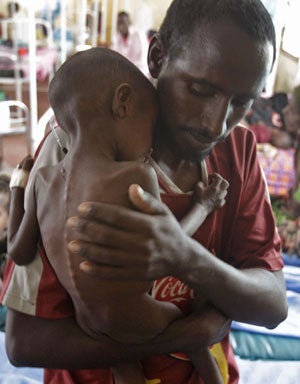Fears that Eritrea may be hiding its famine victims from the world

Concerns are mounting of a possible hidden famine in Eritrea while international aid agencies scramble to fill a "black hole" in information coming out of the isolated Horn of Africa nation.
The UN, Red Cross and other organisations have appealed to the Eritrean government to conduct a joint-assessment as the impact of the drought crisis continues to worsen in neighbouring Somalia and Ethiopia.
Eritrea has so far denied any shortages and accused the international community of crying "crocodile tears" over famine victims in other countries. Ethiopia, where 4.5 million people are in need of humanitarian assistance, as well as 228,000 refugees, claims that more than half the population in Eritrea needs food aid. This has been strongly denied by Eritrea, where presidential adviser Yemane Ghebreab said: "There [are] no food shortages in Eritrea at the present time. Last year, we had a bumper harvest."
In its crisis map of the region the UN has listed Eritrea as "stressed" but officials admit they have almost no information on the situation on the ground. The former Italian colony, once feted for its heroic struggle for independence, has evolved into an international pariah that was this week accused by the UN of planning a bombing campaign against regional rival Ethiopia and has previously been charged with funding Somali militants the Shabab.
The government of long-time leader Isias Afwerki promotes an official creed of self-reliance and regularly insists there is no hunger in Eritrea. The country is almost alone in Africa in refusing foreign aid and has given no detailed information to the UN or the World Food Programme which ceased operations there six years ago. "There's a black hole in information there," said a senior aid official who asked not be identified. "But I'm sure that they're not escaping the effects of this crisis."
Officials at the Red Cross office in the Eritrean capital, Asmara, confirmed that there had been a problem with rains and that they were "waiting for information from the government". According to UN estimates there are now 11.6 million people affected by the food crisis in the Horn of Africa.
Two area of Somalia have been categorised as famine zones and some 2.2 million people have not yet been reached with aid because of ongoing conflict. Washington's lead official on Africa, Johnnie Carson, has voiced concern over what he calls a "closed and increasingly reclusive country" and appealed for more information.
Join our commenting forum
Join thought-provoking conversations, follow other Independent readers and see their replies
Comments